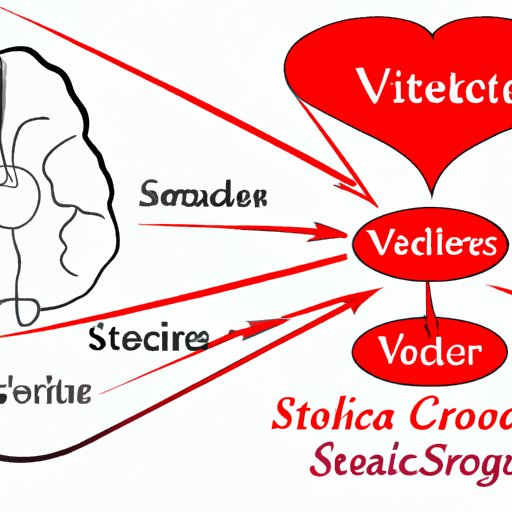
I. Introduction
Stroke is a serious condition that affects millions of people worldwide. Despite the high burden of stroke, many individuals remain unaware of the connection between stroke and cardiovascular disease, a group of conditions that affect the heart and blood vessels. In this article, we will explore the link between stroke and cardiovascular disease and provide strategies for prevention. This article is intended for anyone interested in understanding the relationship between stroke and cardiovascular disease and taking steps to reduce their risk.
II. The Truth Behind Stroke as a Cardiovascular Disease and What You Need to Know
Cardiovascular disease is a group of conditions that affect the heart and blood vessels, including blood vessels in the brain. Stroke is a form of cardiovascular disease that occurs when blood flow to the brain is disrupted, either by a clot or a ruptured blood vessel. Stroke can have a profound impact on a person’s life, leading to disability, cognitive impairment, and even death. In the United States, stroke is the fifth leading cause of death and a leading cause of disability.
III. Understanding the Link Between Cardiovascular Diseases and Stroke
Cardiovascular diseases such as high blood pressure, coronary artery disease, and atrial fibrillation increase the risk of stroke. When blood vessels in the brain are damaged by conditions like high blood pressure, they become more susceptible to blockages and ruptures that lead to stroke. Identifying and treating these underlying conditions is crucial to reducing the risk of stroke.
IV. Why Stroke Should Be Considered as a Major Cardiovascular Disease
Stroke is a major cause of disability and death, and its impact on individuals and society is significant. Compared to other forms of cardiovascular disease, stroke has a higher mortality rate and a greater likelihood of causing long-term disability. Despite its significant impact, stroke receives less attention and resources than other forms of cardiovascular disease, highlighting the need for greater research and prevention efforts.

V. Exploring the Risk Factors and Causes of Stroke as a Cardiovascular Disease
There are several risk factors for stroke, including high blood pressure, smoking, diabetes, and heart disease. These risk factors can damage blood vessels, leading to the formation of blood clots or the development of atherosclerosis, a condition where plaque builds up in the walls of arteries. Addressing these risk factors through lifestyle changes and medical interventions can reduce the risk of stroke.
VI. The Importance of Early Detection and Treatment of Stroke as a Cardiovascular Disease
Early detection and treatment of stroke can greatly improve outcomes for stroke patients. Treatment options for stroke include medications, surgical procedures, and rehabilitation. In addition to medical interventions, emergency measures such as calling 911 immediately can also improve the chances of survival and reduce the risk of disability.
VII. How to Reduce Your Risk of Stroke by Maintaining Cardiovascular Health
There are several strategies for reducing the risk of stroke, including maintaining good cardiovascular health. This can be accomplished through regular exercise, eating a healthy diet, avoiding smoking and excessive alcohol consumption, and managing medical conditions such as high blood pressure and diabetes. Medications such as statins and anticoagulants can also help reduce the risk of stroke.
VIII. Conclusion
Stroke is a serious form of cardiovascular disease that can have a significant impact on a person’s life. However, it is also a preventable and treatable condition. By understanding the link between stroke and cardiovascular disease, identifying and addressing risk factors, and seeking medical attention promptly, individuals can take charge of their cardiovascular health and reduce their risk of stroke.




